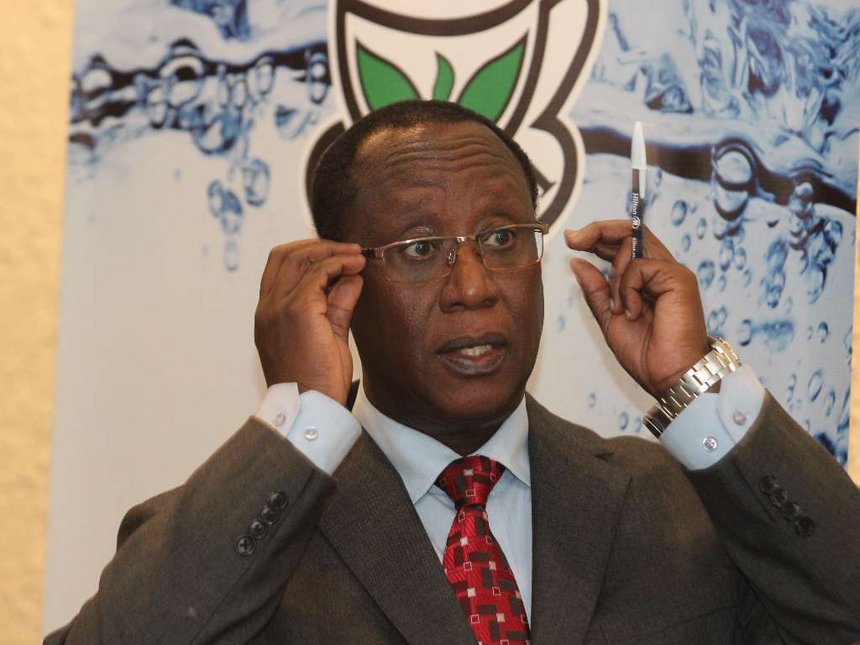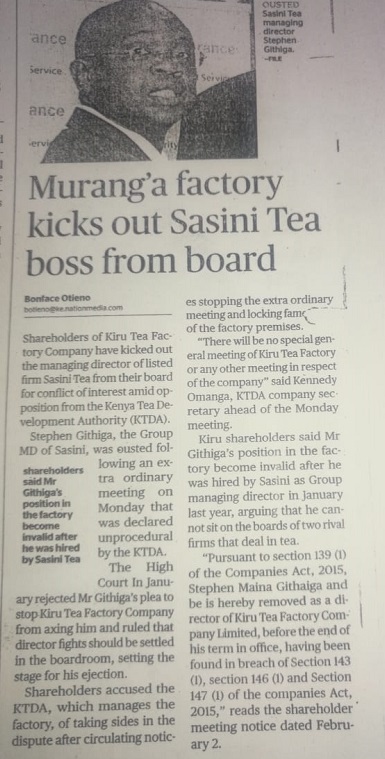When Kenya Tea Development Authority was privatized in 2000, the crafters of the transaction sold the deal as the ultimate solution to farmers’ problems. It was actually a cleverly crafted privatisation deal that transferred assets and mandate to small holder farmers through their tea factories.
And so KTDA (the authority) was transformed overnight into the Kenya Tea Development Agency, there by losing state-corporation status.
Eighteen years later, the change-over leaves a bitter taste in farmers’ mouths so much that now there is a drive from some quarters to revert to the state-corporation status. According to various studies and evidence on the ground, the tea farmer is worse off under the agency.
A Food and Agriculture Organisation (FAO) report shows 50% of small holder tea farmers in the country live below the poverty line despite privatization promising better life and earnings for them. It gets worse as you move down of the Rift Valley, where FAO says poverty levels are at an alarming 76 % among tea growers. As the farmers wallow in poverty, KTDA is understood to be putting up a multi-billion highrise building in Nairobi city centre on Koinange street.
So poor are these farmers that if they can’t afford a cup of tea at a five-star hotel here in Kenya made from the product they produce in plenty. This is because they sell green leaf and with value addition along the way, the final product becomes costly, especially with the specialty variants.
Interested parties – including GEM MP Elisha Odhiambo who has drafted a Bill to have KTDA private status revoked – say the public monopoly of KTDA was transformed in a private monopoly without due considerations. Indeed, failure to properly privatise KTDA has returned to haunt farmers as legal safeguards were overlooked.
The change, Mr Odhiambo argues, weakened supervision of KTDA management by farmers who own the tea factories, leading to major governance compromises that have led to exploitation of farmers through payment of levies and fees, not to mention loss of funds through inflated project costs.
RELATED: KENYAN FIRM SUPPLYING UK WITH HIGH GRADE TEA
Notably, since privatization, no private managing agency has managed to compete with KTDA Ltd for management of over 65 factories spread across the country. Lack of competition, observers say, has stifled innovation and put tea operations in a decline mode. The tea sector supports over 4 million people both directly and indirectly, making it a major plank of Kenya’s economy.

This status has created a fertile ground for thriving of cartels where the small holder farmers are exploited by top KTDA top management, who are accused of operating cartels used to siphon billions of shillings.
The Kenya Tea Development Authority Bill 2018 cites numerous cases of mismanagement, loss of money in collapsed banks (Imperial and Chase Bank), conflicts of interest, contempt of court cases as well as fraud and misappropriation of farmers’ money, to put a case against the current KTDA, which is led by Managing Director Lerionka Tiampati.
Streamlining the tea industry
To streamline tea operations, the Government in 2015 formed a taskforce on the tea industry, which made radical recommendations on turning around the sector. Among them was reforming KTDA’s governance model to deal with conflict of interests where directors of tea factories also sit at KTDA and where procurement is armtwisted to have them also supply the organisation various services and goods often at inflated costs.
The task force, chaired by Kagiri Kamau, proposed a six-point action plan that was hoped to help save farmers from exploitation and ensure sustained higher incomes.
The taskforce recommended market development which would include automation of the auction and electronic trading to root out cartels of brokers who fleece farmers at the auctioning. It also envisioned a higher farmers’ net return to operational cost target of 75:25.
SEE ALSO: SHOCKING EARNINGS FOR TEA FARMERS
“Currently, the net earnings to farmers vis a vis operational costs varies from year to year, from one factory to another with green leaf payment ratio varying between 64:36 and 75:23,” the taskforce says report, which is yet to be released officially. “It is recommended that enterprises aim to achieve above target through production of best quality tea and manage production costs and also match production to demand.”
That, too, as with the proposal on value-addition and cottage industry development, remains just a recommendation.
KTDA ignored presidential directive
The sector appears to defy even President Uhuru Kenyatta, thanks to the cartels that enjoy connections in high offices which stifle any reform attempts. In his address on Jamhuri Day in December 2017, President Kenyatta called on KTDA to make sure small holder growers are no exploited.

“What the president might not have known was that his statement was not going to be treated with seriousness because he stepped on the feet of cartels in the industry,” Mr Odhiambo says, and such they would ignore the directive.
This contempt is extended to the judiciary, where directors of KTDA have numerous cases of contempt of court after defying court orders and rulings. In fact, a High Court ruling in contempt of court cases against 13 directors of KTDA made in Nyeri High Court has never taken place after one of the judges, Mr Sankale ole Kantai, disqualified himself on personal grounds on judgement day. His exit should be taken with a pinch of salt.
Also, there are various cases in courts against KTDA directors on various issues that have not been given direction even as the organisation continues to lose billions and farmers suffer.
A case in point is that of Sasini Tea Managing Director Stephen Maina Githiga, who is fighting remain as director of both KTDA and Kiru tea factory in Murang’a, yet it’s a clear conflict of interest.
“What’s happening in the tea sector is a major rip-off that must be brought to an end through proper and well thought-out streamlining of the management and that can only be achieved through the establishment of an authority which will be answerable to Parliament in its operations,” says Mr Odhiambo, the Gem MP.
“The rules of general liberalisation cannot be allowed to dictate to the small tea farmers while those making gains do not toil on the farms.”
NEXT READ: WHY IT’S TIME TO RETHINK KTDA’S ROLE IN TEA INDUSTRY

















2 Comments